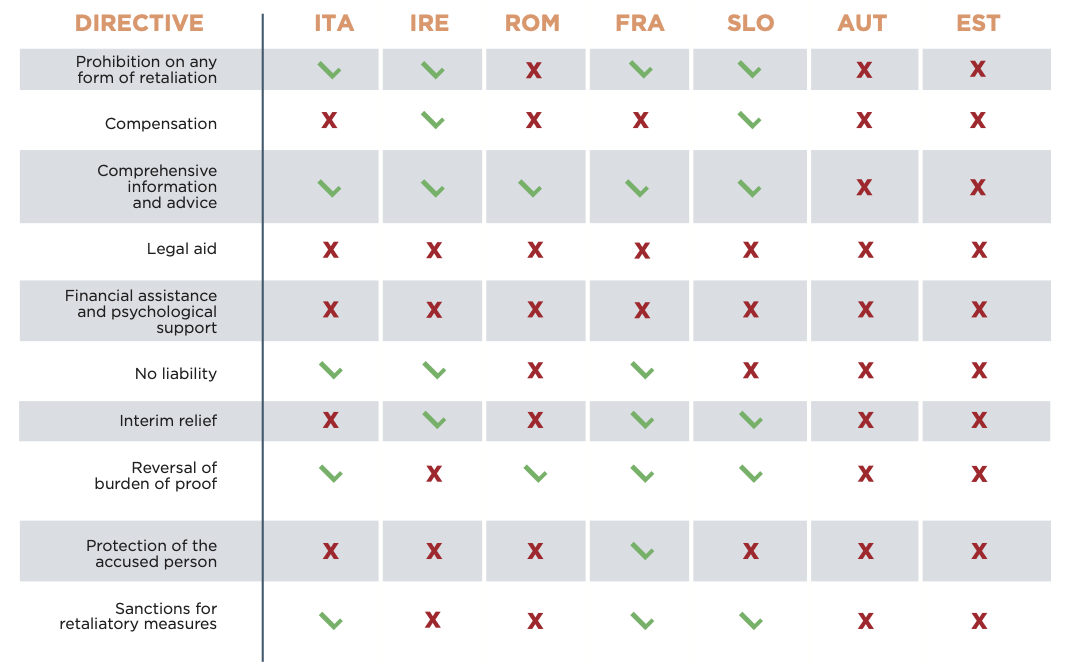Whistleblowing in Italy, Austria, Estonia, France, Ireland, Romania and Slovenia
5. Protection measures, burden of proof and sanctions
 Only France, Slovenia, Italy, and Ireland prohibit any form of retaliation against whistleblowers
for reasons directly or indirectly related to the report.
This is seen in a broad sense, in accordance with the
Directive, meaning that a whistleblower cannot be dismissed, sanctioned, moved or damaged by any other
adverse effects on his/her working conditions.
Only France, Slovenia, Italy, and Ireland prohibit any form of retaliation against whistleblowers
for reasons directly or indirectly related to the report.
This is seen in a broad sense, in accordance with the
Directive, meaning that a whistleblower cannot be dismissed, sanctioned, moved or damaged by any other
adverse effects on his/her working conditions.In France, Italy, and Ireland, in the event of such measures being taken, they are void by law. The judge may
order the reinstatement of any person who has been
dismissed, not had his/her contract renewed or has
been revoked in violation of the legal provisions prohibiting retaliation measures; severance pay may also
be applied if the employee does not request reinstatement or such a measure is impossible.
It is only in Slovenia and Ireland that whistleblowers
have the right to claim compensation from their employer for the damage caused illegally if they have
been subjected to retaliatory measures as a consequence of filing the report. According to the Estonian Civil Service Act, employees are granted the right to
claim compensation from their employer if they have
been punished or illegally dismissed from office.
The Irish Act provides immunity from most civil actions for damages (except for defamation actions).
French, Italian, and Irish law provide the absence of
criminal liability for disclosure of legally protected
secrets if the disclosure of the information is necessary
and proportionate to the interests involved, if it is made
following the reporting procedures defined by law and
if the person meets the criteria for determining a whistleblower.
Several countries, such as Italy and Slovenia, strengthen the protection of whistleblowers by imposing pecuniary sanctions on those who have adopted retaliatory measures.
In the Italian private sector, disciplinary sanctions are provided for those who violate the measures protecting the reporting person. Furthermore, in Italy, ANAC may apply an administrative pecuniary sanction against the responsible party which has not established procedures for making and managing reports or which has established them, but the same do not comply with what is outlined in the law and which has failed to control and analyse the reports received.
In France, the offence of obstructing the alert is punishable by imprisonment and/or a criminal fine, which is increased when the investigating judge or chamber receives an abusive libel complaint against a whistleblower. As mentioned in the previous paragraph, in Slovenia and France, a breach of the whistleblower’s confidentiality can lead to a sanction. In Italy, Slovenia, Ireland and France sanctions also apply for malicious disclosures.
In France, they may be criminal sanctions (imprisonment or a criminal fine), disciplinary sanctions or dismissal for fault. Conversely, in Austria, Romania and Estonia, no sanctions are provided. However, although Romanian law stipulates no sanctions against retaliation or discrimination, disputes that regard work or working relations may be subject to court review which may subsequently cancel any sanctions applied in the wake of a public interest notification.
As a further protection measure against retaliation, Italy, Slovenia, France, and Romania, in line with the Directive, provide a reversal of the burden of proof. In proceedings before a Court or other authority relating to detrimental effects suffered by the reporting person, and subject to that person establishing that he or she reported or made a public disclosure and suffered damage, it shall be presumed that the detrimental effect was a result of retaliation for the report or public disclosure. In such cases, the person who applied the detrimental measure must prove that the measure was based on reasons unrelated to the report.
